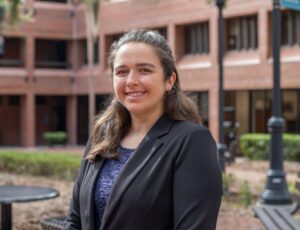Research Spotlight: Elyssa Geer
Q & A with Elyssa Geer, Ph. D., Assistant Professor in the School of Special Education School Psychology & Early Childhood Studies
What research are you currently working on?
I am currently working on understanding the interplay between spatial skills, executive function, and mathematical skills in preschoolers. Spatial skills are a diverse set of skills that allow us to successfully navigate our day-to-day lives. These skills can be as large-scale as our ability to navigate to and from work, or more small-scale like the ability to complete a jigsaw puzzle. My work, in conjunction with a plethora of existing research, has demonstrated a consistent connection between spatial and mathematical skills, though less is known about potential mechanisms that may explain how and why these skills are connected. Executive function may be one such mechanism.
Executive function is comprised of various cognitive skills such as working memory, inhibitory control, cognitive flexibility, behavioral self-regulation, and planning. Working memory is the ability to encode information, carry it in the mind, and utilize it in the successful completion of a goal (e.g., the ability for a child to listen to a word problem, hold key information in their mind, and later use that information to solve the problem). Inhibitory control is the ability to suppress an unwanted behavior in order to engage in a more adaptive one (e.g., the ability for a child to refrain from employing incorrect strategies in order to solve a math problem, suppressing a simpler strategy, for example, in lieu of a more effective one). Cognitive flexibility refers to the ability to shift one’s focus across changing subjects and goals (e.g., the ability to adapt quickly to different representations of quantity such as shifting from using dots to numerals). Behavioral self-regulation is a more complex, multi-faceted executive function skill that involves the integration of working memory, inhibitory control, and cognitive flexibility in observable behaviors. An example of behavioral self-regulation is the ability to participate in a game of “Simon Says” in which you have to learn and remember the cardinal rule of only doing what “Simon Says,” while controlling any undesired behaviors and flexibly shifting between new tasks that you must do because “Simon Says.” Planning is another more complex executive function skill and refers to the ability to achieve a goal through a series of steps that involve organizing thoughts and behaviors to achieve said goal. For example, a child engages their planning skills when they plan out a structure they want to build using blocks in their classroom (e.g., a castle) and taking the necessary steps to build such a structure (e.g., using bigger blocks at the base to make a foundation, then progressively smaller blocks to make the castle walls and towers).
My recent work has demonstrated that cognitive flexibility, behavioral self-regulation, and planning significantly mediate the spatial-mathematical link over time. That is to say that the connection between spatial and mathematical skills is explained, in part or in whole, by preschoolers’ executive function skills.









